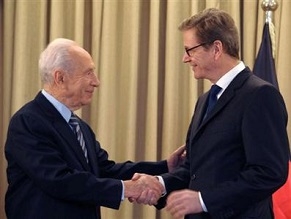|
World Jewish News

Israeli President Shimon Peres met Sunday in Jerusalem with German Foreign Minister Guido Westerwelle.
|
Israel’s Peres to visiting German Foreign Minister: The EU should put its new guidelines on hold in order to help the diplomatic
12.08.2013, Israel and the World Israeli President Shimon Peres said the European Union should put its recent decision to boycott Israeli entities in the West Bank, East Jerusalem and the Golan on hold in order to help the Israeli-Palestinian diplomatic process, during a meeting Sunday in Jerusalem with visiting German Foreign Minister Guido Westerwelle.
Last month, the European Commission issued new guidelines prohibiting any EU funds in theform of grants, prizes and financial instrument from being used by Israeli entities beyond the Green Line.
The guidelines also stipulate that any future agreement with Israel will need to incorporate a clause that the West Bank, East Jerusalem and the Goland Height ‘’are not part of Israel.’’ Such a territorial clause is for Israel very problematic as it has annexed east Jerusalem and the Golan Heights and Israeli law prohibits discriminating against Israeli entities beyond the Green Line.
The guidelines are to be come into effect on January 1,2014.
President Peres told Westerwelle that the EU boycott could create a missed opportunity. Israel and the Arab world have a unique opportunity to reach peace, he said, arguing that the Arab world now supports peace, and that Israel is united around the “two-state solution.”
The EU decision essentially is a decision regarding the final borders between Israel and a future Arab state, he said, but that decision should be made during talks, at which point the EU ruling will in any case no longer be relevant.
Westerwelle said the EU decision regarding the new guidelines should not be seen as a change in EU policy regarding Israel, he said, stressing that the EU seeks cooperation with Israel. The EU and Israel are linked by an association agreement.
"There is no and there will be no policy change of partnership. We seek a sustainable partnership to continue the projects in research fields," the German minister said.
He added that "with goodwill on all sides, pragmatic implementation should be possible, " noting the guidelines were in the hands of the European Commission, the EU’s executive arm.
Westerwelle said he was bringing with him a simple "message of encouragement and support" of the US-sponsored direct talks. "We will play a constructive and supportive role," he said.
Israeli Justice Minister Tzipi Livni, who is the chief Israeli negotiator in talks with the Palestinians, also warned against making the "linkage between Israel, the EU and the Israeli-Palestinian conflict", in a reference to the new EU guideline.
"The future borders of Israel and the future borders of the Palestinian state will be discussed in the negotiations room between Israel and the Palestinians and not as a EU decision, as we saw in the guidelines," she stressed.
Israeli Prime Minister Binyamin Netanyahu said last week that Israel will not sign any contracts with Europe so long as its boycott of Judea, Samaria, eastern Jerusalem and even the Golan Heights continues.
Netanyahu is expected to speak this week with EU foreign policy chief Catherine Ashton to seek a formula that would make it possible for Israel to take part – as the only non-EU member state- in the 80 billion euros (around 107 million dollars) EU’s flagship research and development programme Horizon 2020 that is meant to create jobs and fuel economic growth.
According to The Jerusalem Post, Israel will ask for clarifications about the guidelines and an EU technical team was expected in Israel on Wednesday to start discussions on the Horizon 2020 programme in which Israel has been expected to continue to participate in funding while receiving grants for Israeli scientists and academics in return.
On Friday, Israel’s Deputy Foreign Minister Zeev Elkin offered to negotiate with the EU over the guidelines. ‘’We are ready to hold a creative dialogue with the Europeans. We understand their position. We reject it, we don’t like it, but it’s their right when it comes to using their money,’’ he told Kol Israel.
“We are asking the Europeans to take into consideration the legal and other problems this creates on the Israeli side. We are ready to negotiate but if the terms are the way they are today, then we won’t be able to do it,” he declared.
A spokesman for Catherine Ashton said the EU was willing to provide clarifications on the new guidelines with Israel and was ‘’looking forward to continued successful EU-Israel cooperation.’’
The guidelines were published in the EU Official Journal on July 26.
by: Yossi Lempkowicz
EJP
|
|
